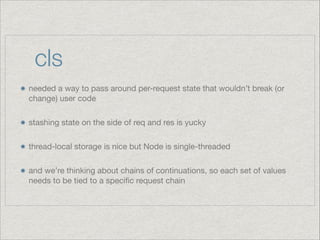CLS & asyncListener: asynchronous observability for Node.js
- 2. cls needed a way to pass around per-request state that wouldnŌĆÖt break (or change) user code stashing state on the side of req and res is yucky thread-local storage is nice but Node is single-threaded and weŌĆÖre thinking about chains of continuations, so each set of values needs to be tied to a speci’¼üc request chain
- 3. a dirt-simple example var ┬Ācls ┬Ā= ┬Ārequire('continuation-┬ŁŌĆÉlocal-┬ŁŌĆÉstorage'); ┬Ā ┬Ā ┬Ā function ┬Āmagic() ┬Ā{ ┬Ā ┬Ā ┬Āconsole.log("value ┬Āis ┬Ā%s", ┬Ācls.getNamespace('test').get('value')); ┬Ā } ┬Ā ┬Ā ┬Ā var ┬Ātest ┬Ā= ┬Ācls.createNamespace('test'); ┬Ā test.run(function ┬Ā() ┬Ā{ ┬Ā ┬Ā ┬Ātest.set('value', ┬Ā'hi ┬Āthere!'); ┬Ā ┬Ā ┬ĀsetImmediate(magic); ┬Ā }); ┬Ā test.set('value', ┬Ā'oh ┬Āno!'); ┬Ā
- 4. things to note magic does not have test in scope inside test.run, values have their own scope testŌĆÖs values persist across the call to setImmediate
- 5. whatŌĆÖs going on? namespace.run clones the current context the contexts are entered and exited like domains the state is persisted across process.nextTick, timers, and all other core async functions
- 7. THEREŌĆÖS NO WAY IŌĆÖM LETTING ANOTHER THING AS SLOW AS DOMAINS IN CORE ŌĆō TREVNORRIS
- 8. srs bzns very powerful but low-level API captures every async event in the Node process and makes it observable makes it simple to pass state to callbacks without changing their code also makes it easy to write global error handlers that have some state
- 9. the API a listener function that is ’¼üred for every async event, returns a value that will be passed to the decorators on this async eventŌĆÖs callbacks a bundle of optional before, after, and error callbacks that will be wrapped around functions that this async event is responsible for an optional value that can be passed to before / after / error instead of the results of the listener
- 10. how it go??! in 0.11.8 and earlier, a JavaScript poly’¼üll that monkeypatches all the things (so, pretty slow) in 0.11.9+, a whole bunch of code in C++ and JavaScript (but still, not a performance king)
- 11. how it stable? poly’¼üll has pretty good coverage, doesnŌĆÖt appear to slow apps down too much in practice (just recently solidi’¼üed enough) poly’¼üll is in use in the New Relic transaction tracer the native version is stable enough that Trevor rewrote domains to use it (and got a nice performance boost when domains arenŌĆÖt in use)
- 12. what for? CLS, obviously low-level logging modules pure JS pro’¼ülers long stacktrace modules making the details of asynchronous execution more observable, basically












